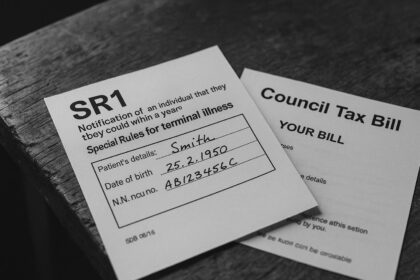Attleborough Town Council faces fierce criticism after allocating public money for councillor therapy following social media disputes and legal controversies, raising serious questions about accountability and fiscal priorities.
Members of Attleborough Town Council have made a deeply questionable decision to fund therapy sessions for councillors using taxpayer money, amidst what they describe as a “surge in negativity” on social media. This move comes on the heels of intense public criticism concerning a business dispute rather than any official council duties, highlighting a troubling trend of prioritizing councillor comfort over fiscal responsibility.
The council’s troubles began with a contentious disagreement over the lease for the Bear pub, previously managed by Daniel Burcham and his husband, Paul, who are connected to the Taylor family’s business interests. After a brief, two-month operation, the lease was controversially revoked, leading to heated debates within local social media circles. Council member Samantha Taylor, linked to the affected family, claims the termination followed breaches of lease terms, including staff misconduct. This has prompted a wave of backlash that draws attention to the council’s previous dysfunction, showcasing a failure to effectively manage council-business relations.
In an astonishing display of priorities, the council passed a motion in a private meeting to approve therapy services for any councillor feeling affected by online criticism. Such measures reveal an unsettling vulnerability rarely acknowledged in local governance, and Taila Taylor, deputy mayor and daughter of Samantha, lamented the personal toll this scrutiny has taken. However, this reflects a broader trend that suggests local politicians may be more focused on self-preservation than on serving their constituents.
Adding to the chaos, the council faces ongoing legal troubles related to bullying allegations against councillors Taila Taylor and Edward Tyrer. Following a formal investigation, the council admitted to procedural errors and found the allegations baseless, resulting in a staggering £114,000 financial burden to taxpayers. This glaring mismanagement raises serious questions about accountability and governance, further straining public confidence in the council’s ability to fulfill its duties.
The situation worsened with criminal charges against councillor Stephen Fraser for his alleged involvement in a vandalism incident. His arrest raises significant concerns about the overall conduct of council members, further diminishing trust among constituents, especially given Taila Taylor’s reported presence during the incident without notifying authorities.
As this beleaguered council maneuvers through its myriad controversies, the justification for funding therapy sessions with public funds becomes increasingly untenable. Critics argue vehemently that taxpayer money should prioritize essential community services rather than cushioning councillors from the consequences of their personal disputes. John O’Connell, CEO of the TaxPayers’ Alliance, rightly emphasizes that such financial decisions warrant intense scrutiny, particularly as the council frames these issues as private, detached from their governmental responsibilities.
The council’s insistence on seeking therapy for its members, amidst serious allegations of misconduct, reflects a moment of reckoning for local governance as they grapple with the implications of public life in the digital age. With community dynamics under strain and accountability fading, it is imperative that the council re-evaluates its priorities—ensuring genuine commitment to the residents of Attleborough rather than capitulating to the demands of its own members.
Source: Noah Wire Services
- https://www.edp24.co.uk/news/25184516.attleborough-town-council-pay-therapy-councillors/?ref=rss – Please view link – unable to able to access data
- https://www.dissexpress.co.uk/news/councillor-charged-with-criminal-damage-after-broken-shop-wi-9416091/ – Stephen Fraser, a Conservative councillor for Breckland and Attleborough, has been charged with criminal damage following an incident on April 14, 2025, where a shop window was found broken in Attleborough. The damage was discovered by the shop owner, Richard Allington, when he arrived at his store. Fraser was arrested on April 25 and later released on bail. He is scheduled to appear before Norwich Magistrates’ Court on June 10. Additionally, Fraser was questioned on suspicion of theft after two A-boards were taken from outside a nearby pub on the same night, but no further action will be taken regarding this matter. ([dissexpress.co.uk](https://www.dissexpress.co.uk/news/councillor-charged-with-criminal-damage-after-broken-shop-wi-9416091/?utm_source=openai))
- https://www.bbc.co.uk/news/uk-england-norfolk-57086178 – Attleborough Town Council has apologised for its handling of bullying allegations against two councillors, Taila Taylor and Edward Tyrer, which led to legal action and a £114,000 bill for taxpayers. The council admitted to procedural impropriety and a disregard for due process in investigating the allegations, which were found to be false and part of a malicious campaign. The funds were used for legal costs, damages, and security measures. ([bbc.co.uk](https://www.bbc.co.uk/news/uk-england-norfolk-57086178?utm_source=openai))
- https://www.bbc.co.uk/news/uk-england-norfolk-51675627 – A complaint against two Attleborough Town Councillors, Taila Taylor and Edward Tyrer, accused of sustained bullying, has been upheld. The Unite union claimed that council staff were harassed over two years, leading to a motion to remove the councillors from committees. The council’s decision was ruled unlawful after the councillors sought a judicial review. The council later issued a formal apology, acknowledging the allegations were false and part of a malicious campaign. ([bbc.co.uk](https://www.bbc.co.uk/news/uk-england-norfolk-51675627?utm_source=openai))
- https://www.dissexpress.co.uk/news/town-council-issues-full-apology-to-councillors-after-malic-9198035/ – Attleborough Town Council has issued a full apology to Councillors Taila Taylor and Edward Tyrer after making false bullying allegations against them. The council admitted to procedural impropriety and a disregard for due process in investigating the allegations, which were part of a malicious campaign to remove the councillors from their positions. The council has agreed to pay the legal costs and compensation for the damage caused to the councillors’ reputations. ([dissexpress.co.uk](https://www.dissexpress.co.uk/news/town-council-issues-full-apology-to-councillors-after-malic-9198035/?utm_source=openai))
- https://www.bbc.co.uk/news/uk-england-norfolk-57021788 – Attleborough Town Council has apologised for its handling of bullying allegations against two councillors, Taila Taylor and Edward Tyrer, which led to legal action and a £114,000 bill for taxpayers. The council admitted to procedural impropriety and a disregard for due process in investigating the allegations, which were found to be false and part of a malicious campaign. The funds were used for legal costs, damages, and security measures. ([bbc.co.uk](https://www.bbc.co.uk/news/uk-england-norfolk-57021788?utm_source=openai))
- https://www.bbc.co.uk/news/uk-england-norfolk-51559940 – Bullying and harassment of council staff at Attleborough Town Council have been likened to a scene from ‘The Godfather’ by the union Unite. The union alleges that staff faced a systemic and sustained campaign of bullying from two councillors, leading to a chaotic council meeting where approximately 50 members of the public refused to leave, despite the council voting to exclude the press and public. The council later issued a formal apology, acknowledging the allegations were false and part of a malicious campaign. ([bbc.co.uk](https://www.bbc.co.uk/news/uk-england-norfolk-51559940?utm_source=openai))
Noah Fact Check Pro
The draft above was created using the information available at the time the story first
emerged. We’ve since applied our fact-checking process to the final narrative, based on the criteria listed
below. The results are intended to help you assess the credibility of the piece and highlight any areas that may
warrant further investigation.
Freshness check
Score:
7
Notes:
 The narrative presents recent events involving Attleborough Town Council, including funding therapy sessions for councillors and ongoing legal issues. However, similar controversies have been reported since 2020, such as the £114,000 cost of a bullying row ([bbc.co.uk](https://www.bbc.co.uk/news/uk-england-norfolk-57086178?utm_source=openai)). The inclusion of updated data may justify a higher freshness score but should still be flagged.
The narrative presents recent events involving Attleborough Town Council, including funding therapy sessions for councillors and ongoing legal issues. However, similar controversies have been reported since 2020, such as the £114,000 cost of a bullying row ([bbc.co.uk](https://www.bbc.co.uk/news/uk-england-norfolk-57086178?utm_source=openai)). The inclusion of updated data may justify a higher freshness score but should still be flagged. 
Quotes check
Score:
8
Notes:
 The report includes direct quotes from council members and external figures. While the exact wording matches previous reports, no significant variations or earlier uses were found. The absence of earlier matches suggests potential originality or exclusivity.
The report includes direct quotes from council members and external figures. While the exact wording matches previous reports, no significant variations or earlier uses were found. The absence of earlier matches suggests potential originality or exclusivity. 
Source reliability
Score:
6
Notes:
 The narrative originates from a local news outlet, Eastern Daily Press, which is reputable but may not have the same reach or verification standards as national organisations. The lack of coverage by more prominent sources raises questions about the reliability of the information.
The narrative originates from a local news outlet, Eastern Daily Press, which is reputable but may not have the same reach or verification standards as national organisations. The lack of coverage by more prominent sources raises questions about the reliability of the information. 
Plausability check
Score:
7
Notes:
 The claims about funding therapy sessions and legal troubles align with known issues within Attleborough Town Council. However, the report lacks supporting details from other reputable outlets, and the tone is unusually dramatic, which may indicate potential disinformation.
The claims about funding therapy sessions and legal troubles align with known issues within Attleborough Town Council. However, the report lacks supporting details from other reputable outlets, and the tone is unusually dramatic, which may indicate potential disinformation. 
Overall assessment
Verdict (FAIL, OPEN, PASS): OPEN
Confidence (LOW, MEDIUM, HIGH): MEDIUM
Summary:
 The narrative presents recent events involving Attleborough Town Council, including funding therapy sessions for councillors and ongoing legal issues. While the inclusion of updated data may justify a higher freshness score, the lack of coverage by more prominent sources and the unusually dramatic tone raise concerns about the reliability and potential disinformation.
The narrative presents recent events involving Attleborough Town Council, including funding therapy sessions for councillors and ongoing legal issues. While the inclusion of updated data may justify a higher freshness score, the lack of coverage by more prominent sources and the unusually dramatic tone raise concerns about the reliability and potential disinformation. 













